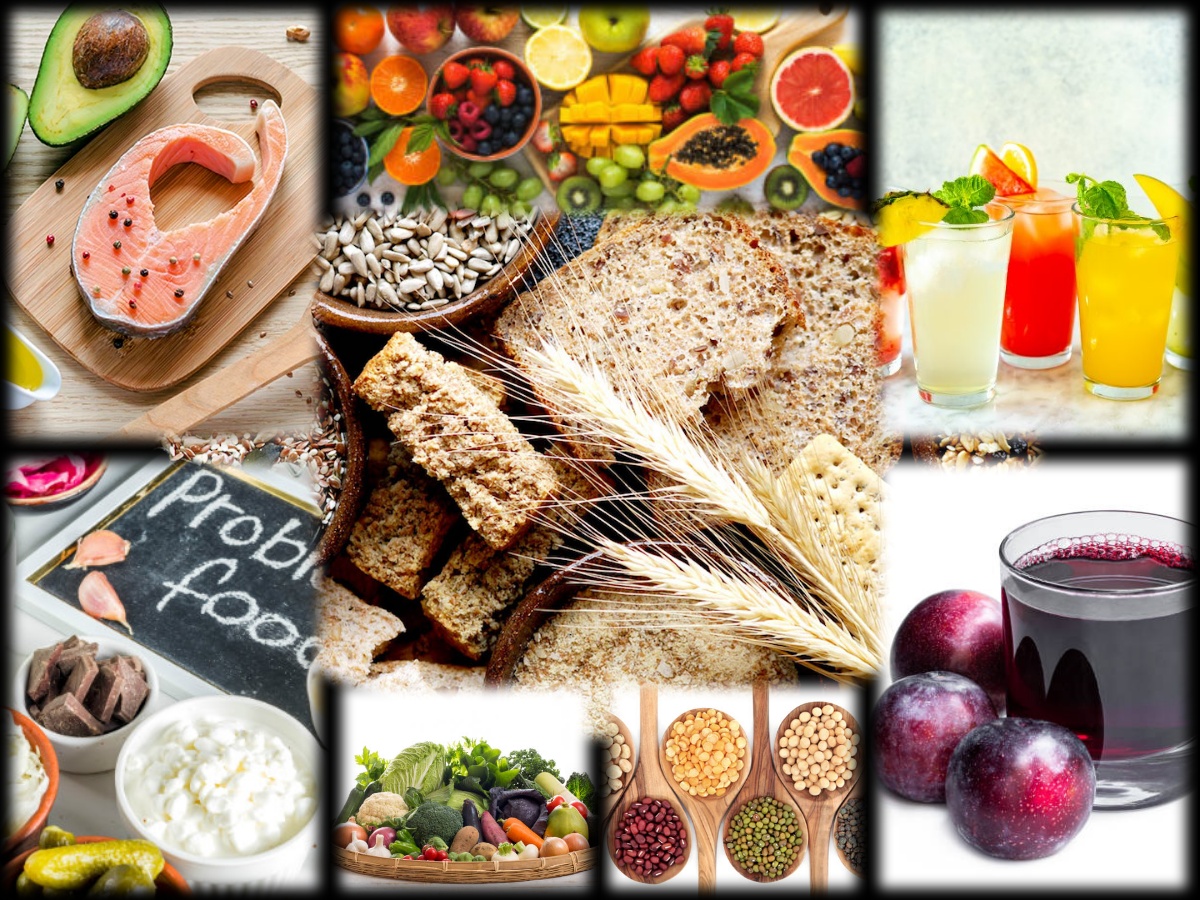Introduction:
Constipation is a common digestive issue characterized by infrequent bowel movements, difficulty passing stool, and discomfort. While various factors contribute to constipation, including lifestyle, hydration, and medical conditions, diet plays a significant role. Making appropriate dietary choices can alleviate constipation symptoms and promote regularity. This article explores the foods to eat and those to avoid to combat constipation effectively.
Contents:
Foods to Eat for Combating Constipation:
Fiber-Rich Foods:
Fiber is crucial for maintaining bowel regularity as it adds bulk to stool and promotes smooth passage through the digestive tract. Include plenty of fiber-rich foods in your diet, such as:
Fruits:

Vegetables:

Whole Grains:

Legumes:

Hydration:
- Adequate hydration is essential for softening stool and facilitating bowel movements.
- Drink plenty of water throughout the day to stay hydrated and support digestive health.
- Herbal teas, clear soups, and hydrating fruits like watermelon and cucumbers can also contribute to fluid intake.

Prunes and Prune Juice:
- Prunes are renowned for their natural laxative effects due to their high fiber and sorbitol content.
- Sorbitol acts as an osmotic agent, drawing water into the intestines and promoting bowel movements.
- Consuming prunes or drinking prune juice regularly can help alleviate constipation symptoms effectively.

Probiotic-Rich Foods:
- Probiotics are beneficial bacteria that promote gut health and regularity.
- Incorporate probiotic-rich foods into your diet to maintain a healthy balance of gut flora and support digestion.
- Examples include yogurt, kefir, kimchi, sauerkraut, and kombucha.

Healthy Fats:
- Including healthy fats in your diet can help lubricate the intestines and ease bowel movements.
- Opt for sources of omega-3 fatty acids, such as fatty fish (salmon, mackerel), flaxseeds, chia seeds, walnuts, and olive oil.

Foods to Avoid for Combating Constipation:
- Highly Processed Foods:
- Processed foods are often low in fiber and essential nutrients, contributing to constipation.
- Limit your intake of fast food, sugary snacks, white bread, and processed meats, as they can worsen constipation symptoms.
- Excessive Dairy Consumption:
- While dairy products can be a source of calcium and protein, excessive consumption, especially of cheese and whole milk, can lead to constipation in some people.
- Consider reducing dairy intake or opting for lactose-free alternatives if dairy exacerbates constipation.
- Red Meat:
- Red meat, particularly when consumed in large quantities, can slow down digestion and increase the risk of constipation.
- Limit your intake of red meat and opt for leaner protein sources such as poultry, fish, tofu, and legumes.
- Caffeine and Alcohol:
- Both caffeine and alcohol can have dehydrating effects on the body, which can exacerbate constipation.
- Limit your consumption of caffeinated and alcoholic beverages, and ensure adequate hydration by drinking water throughout the day.
- Low-Fiber, Low-Water Diet:
- Diets lacking in fiber and water content are a common cause of constipation.
- Avoiding fruits, vegetables, whole grains, and sufficient water intake can lead to sluggish digestion.
- Prioritize the essential components of a healthy diet to support regular bowel movements.
General Tips for Incorporating A Healthy Diet Routine:
Incorporating a healthy diet routine into your lifestyle is essential for overall well-being and longevity. A balanced diet provides your body with the necessary nutrients it needs to function optimally, boosts energy levels, supports a healthy weight, and reduces the risk of chronic diseases.
Here are some general tips to help you establish and maintain a healthy diet routine:
- Plan Ahead:
- Take time to plan your meals and snacks for the week.
- This can help you make healthier choices and avoid impulsive, unhealthy options.
- Create a grocery list based on your meal plan to ensure you have all the necessary ingredients on hand.
- Focus on Whole Foods:
- Prioritize whole, minimally processed foods such as fruits, vegetables, whole grains, lean proteins, and healthy fats.
- Limit your intake of processed and refined foods, which are often high in added sugars, unhealthy fats, and sodium.
- Eat a Variety of Nutrient-Dense Foods:
- Aim to incorporate a diverse range of foods from all food groups into your diet to ensure you’re getting a wide array of nutrients.
- Choose colorful fruits and vegetables, lean proteins, whole grains, and sources of healthy fats to maximize nutritional benefits.
- Portion Control:
- Be mindful of portion sizes to prevent overeating and maintain a healthy weight.
- Use smaller plates and bowls to help control portion sizes, and listen to your body’s hunger and fullness cues.
- Stay Hydrated:
- Drink plenty of water throughout the day to stay hydrated and support bodily functions.
- Limit sugary drinks and alcohol consumption, opting for water, herbal teas, and other low-calorie beverages instead.
- Include Fiber-Rich Foods:
- Incorporate fiber-rich foods such as fruits, vegetables, whole grains, legumes, nuts, and seeds into your meals and snacks.
- Fiber helps promote digestive health, keeps you feeling full longer, and can aid in weight management.
- Limit Added Sugars and Saturated Fats:
- Reduce your intake of foods and beverages high in added sugars, such as sodas, sweets, and processed snacks.
- Choose sources of healthy fats like avocados, nuts, seeds, and olive oil over foods high in saturated and trans fats.
- Cook at Home More Often:
- Prepare meals at home whenever possible, as this allows you to control the ingredients and cooking methods used.
- Experiment with healthy recipes and cooking techniques to make nutritious meals that are both delicious and satisfying.
- Be Mindful of Snacking:
- Choose nutrient-dense snacks such as fresh fruit, yogurt, nuts, or whole grain crackers with hummus.
- Avoid mindless snacking and try to eat only when you’re truly hungry rather than out of boredom or habit.
- Practice Moderation, Not Deprivation:
- Allow yourself to enjoy your favorite foods in moderation rather than completely depriving yourself.
- Focus on balance and overall dietary patterns rather than strict rules or restrictions.
- Listen to Your Body:
- Pay attention to how different foods make you feel and adjust your diet accordingly.
- Eat when you’re hungry and stop when you’re satisfied, rather than eating based on external cues or emotions.
By incorporating these tips into your daily routine, you can establish a healthy diet that supports your overall health and well-being for the long term. Remember that consistency and moderation are key, and small changes over time can lead to significant improvements in your dietary habits and health outcomes.
Conclusion:
Making informed dietary choices is crucial for managing and preventing constipation. By including fiber-rich foods, staying hydrated, and avoiding dietary factors that contribute to constipation, you can promote optimal digestive health. Recognizing the impact of diet on bowel function empowers anyone to take proactive steps toward alleviating constipation symptoms and maintaining overall well-being.










